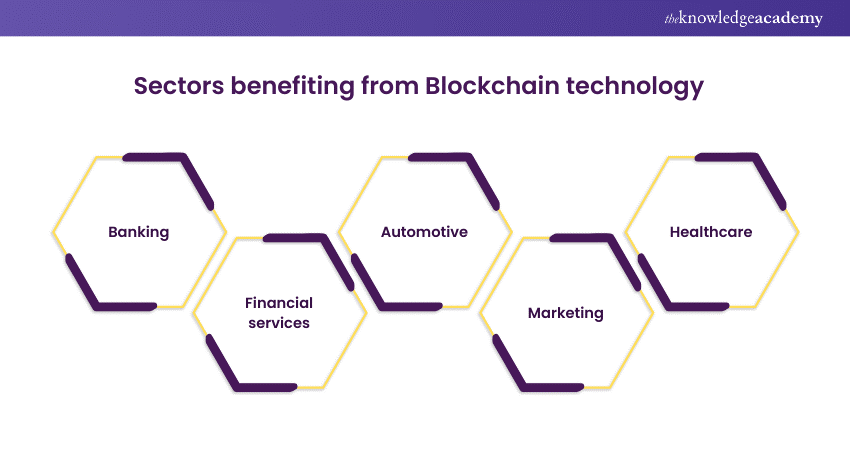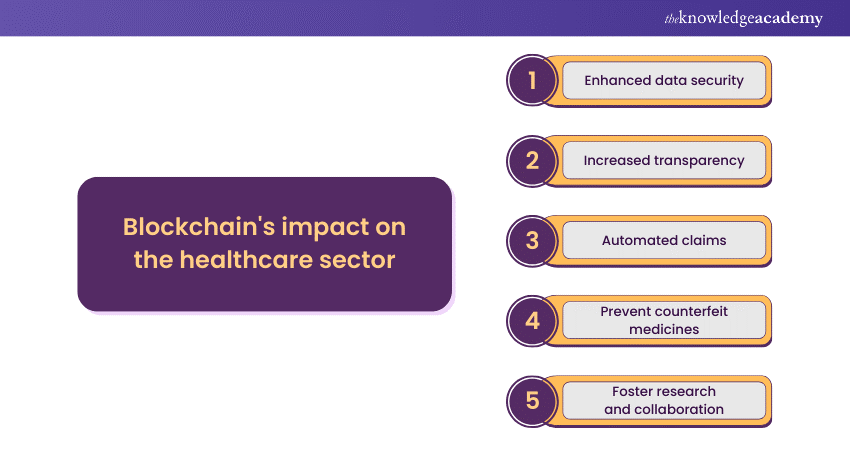We may not have the course you’re looking for. If you enquire or give us a call on + 1-866 272 8822 and speak to our training experts, we may still be able to help with your training requirements.
Training Outcomes Within Your Budget!
We ensure quality, budget-alignment, and timely delivery by our expert instructors.

When it comes to the evolving landscape of Blockchain technology, staying informed is crucial. In a world where digital currencies and decentralised networks are gaining prominence, not understanding the core facts can lead to missed opportunities and potential pitfalls. Understanding the important Blockchain Facts can help you navigate this dynamic terrain effectively.
In this blog, you will learn what Blockchain is and ten Interesting Blockchain Facts. Let's dive in deeper to know more!
Table of Contents
1) What is Blockchain?
2) Key Facts about Blockchain
a) The Genesis of Blockchain: Early 1980s
b) Cryptocurrency's anchor: Blockchain infrastructure
c) Persistent growth in Blockchain's industry applications
d) Distributed Ledger Technology (DLT): Decentralised and secure
e) Growing corporate investment in Blockchain
f) Blockchain's remarkable growth
g) Over 81 million Blockchain wallets exist
h) Paving the way for the fifth industrial revolution
i) Advancements in technology for an eco-friendly Blockchain
j) Blockchain's impact on the healthcare sector
3) Conclusion
What is Blockchain?
Blockchain is a decentralised technology that can record transactions across multiple computers securely and transparently. It consists of a chain of blocks, each containing a batch of transactions. Once added, these blocks are immutable, making the data tamper resistant.
Blockchain's consensus mechanism ensures trust without the need for intermediaries, making it a cornerstone of digital innovation.
Key Facts about Blockchain
Blockchain technology has transcended its roots as a foundation for Cryptocurrencies. It has emerged as a disruptive force with transformative potential across industries. Here, we explore ten key Blockchain Facts, shedding light on the diverse facets and impact of Blockchain.
1) The Genesis of Blockchain: Early 1980s
A retrospective examination of Blockchain's origins reveals its conceptualisation in the early 1980s. However, it was not until a 1991 white paper authored by Stuart Haber and W. Scott Stornetta that the practical implementation of timestamping digital documents became feasible.
The watershed moment occurred in 2008 when the enigmatic creator Satoshi Nakamoto referenced Haber and Stornetta's work in the original Bitcoin white paper, utilising Blockchain infrastructure to birth Cryptocurrencies.
2) Cryptocurrency's anchor: Blockchain infrastructure
Numerous Cryptocurrencies, including prominent digital coins such as Bitcoin and Ethereum, operate on Blockchain technology. The United States alone boasts most of the global Blockchain startups.
Blockchain systems, distinguished by their decentralisation and immutable transaction recording, enable the creation of decentralised digital currencies and peer-to-peer transactions, bypassing intermediaries like banks.
3) Persistent growth in Blockchain's industry applications
Blockchain's transformative influence extends to various industries, including banking, financial services, automotive, government, life sciences, entertainment, media, marketing, healthcare, telecommunications, insurance, retail, and Fast-Moving Consumer Goods (FMCG).

For instance, Blockchain facilitates the development of Non-Fungible Tokens (NFTs) in the entertainment sector. It helps safeguard the rights of digital creators and invigorate the digital art realm.
In the realm of elections, governments can use Blockchain to record votes anonymously and securely. Similarly, in real estate transactions, Blockchain expedites property trading by eliminating protracted legal processes, thanks to its tamper-proof data storage.
The financial sector has embraced Blockchain integration, offering crypto credit cards to Bitcoin wallet holders for swift and secure transactions.
4) Distributed Ledger Technology (DLT): Decentralised and secure
Blockchain, synonymous with Distributed Ledger Technology (DLT), encompasses a distributed and decentralised database that securely logs transactions across Blockchain networks. This ledger, shared among network nodes, stores information digitally. Its decentralisation places trust in Blockchain's members rather than relying on a central authority like central banks.
One of its paramount advantages lies in the immutability of recorded transactions. From Non-Fungible Tokens (NFTs) to smart contracts, Blockchain digitisation ensures the secure trading of intellectual and physical assets.
5) Growing corporate investment in Blockchain
According to Deloitte’s 2021 Global Blockchain Survey, 73% of enterprises view Blockchain adoption as critical for maintaining competitive advantages. Furthermore, 76% of respondents anticipate the dominance of Cryptocurrencies within the next decade.
6) Blockchain's remarkable growth
Unsurprisingly, Blockchain technology is experiencing unprecedented growth due to its continual evolution. Global spending on Blockchain is poised to surge as new use cases emerge daily. This surge in interest and investment forecasts a substantial expansion in the global Blockchain technology market.
Projections indicate that the market, valued at £5 billion in 2021, is expected to skyrocket to £977 billion by 2030, as per Statista. It maintains an impressive annual growth rate of 82.2%.
Unlock the future of Blockchain with our Ethereum Developer Training – Sign up today!
7) Over 81 million Blockchain wallets exist
Blockchain infrastructure serves a vital role for both businesses and consumers, who are embracing digital currencies at an unprecedented rate. Over recent years, the number of Cryptocurrency and Blockchain wallet owners has surged tremendously. According to Statista, the number of Blockchain wallet owners has surpassed 81 million.
8) Paving the way for the fifth industrial revolution
One of the most intriguing Facts about Blockchain is its profound impact on the global market. Studies suggest that Blockchain is a catalyst for initiating the fifth industrial revolution, fostering a more symbiotic relationship between humans and technology. Moreover, it is enabling secure automation in industries facing unprecedented challenges.
For example, within the supply chain, Blockchain solutions combined with smart packaging and the Internet of Things (IoT) can immutably record the journey of each item from manufacturer to consumer. This significantly reduces the risk of falsification, counterfeiting, refilling, and diversion, ensuring the safety of both manufacturers and consumers.
9) Advancements in technology for an eco-friendly Blockchain
While Blockchain innovations have enabled faster and more cost-effective Bitcoin transactions, they have also contributed to a growing environmental concern. This is mainly due to the increased emissions.
Major Cryptocurrencies like Ethereum, for instance, once consumed a staggering 93.98 TeraWatt-hours (TWh) annually, equivalent to the energy consumption of a small country. Fortunately, leading digital currencies have proactively sought ways to mitigate their environmental footprint. According to a CCRI Report, Ethereum achieved a remarkable 99.9% reduction in emissions through the Merge upgrade.
This transition shifted from a resource-intensive Proof-of-Work system to a more energy-efficient Proof-of-Stake system. This significantly reduces the need for energy-intensive specialised equipment.
10) Blockchain's impact on the healthcare sector
The healthcare industry, known for its cautious approach to adopting new technology, is gradually opening its doors to Blockchain. Blockchain's tamper-proof design, immutable records, and transparency hold promise in addressing healthcare's data challenges.

The healthcare sector generates vast amounts of sensitive data, demanding robust security to safeguard patient privacy. Blockchain leverages cryptography and decentralised storage to ensure the security and integrity of this data. Moreover, it reduces the risk of counterfeit products through traceable and immutable records.
Smart contracts also play a pivotal role, automating payments when specific conditions are met, enhancing efficiency and trust in the system.
Master the world of digital currencies with our Bitcoin and Cryptocurrency Course – Sign up now!
Conclusion
We hope you read and understand these ten Blockchain Facts. These Facts highlight the technology's profound impact and potential. From its role in Cryptocurrency to its applications across various industries, Blockchain continues to grow at an astonishing rate. As a harbinger of the fifth industrial revolution, Blockchain's significance in our evolving world cannot be understated.
Become a Blockchain expert today with our Blockchain Courses – Sign up today!
Frequently Asked Questions

Blockchain technology has had a transformative effect on various sectors, including finance, healthcare, supply chain, and more. Its Distributed Ledger system enhances security, transparency, and efficiency, making it a versatile solution for many industries.

Blockchain's security is based on its decentralised and immutable ledger, making it resistant to tampering and fraud. The cryptographic techniques used in Blockchain ensure the integrity and privacy of data. Additionally, consensus mechanisms like Proof-of-Work and Proof-of-Stake add layers of security to the network.

The Knowledge Academy takes global learning to new heights, offering over 30,000 online courses across 490+ locations in 220 countries. This expansive reach ensures accessibility and convenience for learners worldwide.
Alongside our diverse Online Course Catalogue, encompassing 17 major categories, we go the extra mile by providing a plethora of free educational Online Resources like News updates, Blogs, videos, webinars, and interview questions. Tailoring learning experiences further, professionals can maximise value with customisable Course Bundles of TKA.

The Knowledge Academy’s Knowledge Pass, a prepaid voucher, adds another layer of flexibility, allowing course bookings over a 12-month period. Join us on a journey where education knows no bounds.

The Knowledge Academy offers various Blockchain Training, including Bitcoin and Cryptocurrency Course, Ethereum Developer Training and many more. These courses cater to different skill levels, providing comprehensive insights into Blockchain Developer Skills.
Our Advanced Technology Blogs cover a range of topics related to Blockchain, offering valuable resources, best practices, and industry insights. Whether you are a beginner or looking to advance your knowledge of Blockchain, The Knowledge Academy's diverse courses and informative blogs have you covered.
Upcoming Advanced Technology Resources Batches & Dates
Date
 Blockchain Training Course
Blockchain Training Course
Thu 23rd Jan 2025
Thu 27th Mar 2025
Thu 15th May 2025
Thu 17th Jul 2025
Thu 25th Sep 2025
Thu 13th Nov 2025







 Top Rated Course
Top Rated Course



 If you wish to make any changes to your course, please
If you wish to make any changes to your course, please


